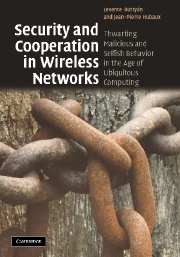 Security and Cooperation in Wireless Networks
Security and Cooperation in Wireless Networks Book contents
- Frontmatter
- Contents
- Preface
- Acknowledgements
- Part I Introduction
- Part II Thwarting malicious behavior
- Part III Thwarting selfish behavior
- 9 Selfish behavior at the MAC layer of CSMA/CA
- 10 Selfishness in packet forwarding
- 11 Wireless operators in a shared spectrum
- 12 Secure protocols for behavior enforcement
- Appendix A Introduction to cryptographic algorithms and protocols
- Appendix B A tutorial on game theory for wireless networks
- References
- Index
11 - Wireless operators in a shared spectrum
from Part III - Thwarting selfish behavior
Published online by Cambridge University Press: 05 June 2012
- Frontmatter
- Contents
- Preface
- Acknowledgements
- Part I Introduction
- Part II Thwarting malicious behavior
- Part III Thwarting selfish behavior
- 9 Selfish behavior at the MAC layer of CSMA/CA
- 10 Selfishness in packet forwarding
- 11 Wireless operators in a shared spectrum
- 12 Secure protocols for behavior enforcement
- Appendix A Introduction to cryptographic algorithms and protocols
- Appendix B A tutorial on game theory for wireless networks
- References
- Index
Summary
In the previous two chapters, we have focused on the behavior of selfish nodes and shown how this can be modeled by means of game theory. In this chapter, we will consider the co-existence of several operators in shared spectrum. We will first discuss multi-domain sensor networks and then address the more involved case of cellular operators.
It is important to stress, as we already did at the beginning of Part III, that the cases presented hereafter must be understood as examples that capture the interactions of operators in shared spectrum, and not as the scenarios on which the manufacturers and operators will focus in the very near future.
Multi-domain sensor networks
An important design criterion for sensor networks is the minimization of the sensors' energy consumption. The sensors are often battery powered and it is impractical (and, in some cases, even impossible) to change or recharge the batteries once the sensors have been deployed. It is known that the energy required to transmit a data packet increases (at least) as the square of the distance of the transmission. In practice, this means that, as far as energy consumption is concerned, it is often more advantageous to transmit a packet in several small hops than to transmit it in a single large hop. Hence, if there are numerous sensors near each other, then they could transmit the packets together and thus increase the lifetime of their batteries radically.
Information
- Type
- Chapter
- Information
- Security and Cooperation in Wireless NetworksThwarting Malicious and Selfish Behavior in the Age of Ubiquitous Computing, pp. 350 - 378Publisher: Cambridge University PressPrint publication year: 2007